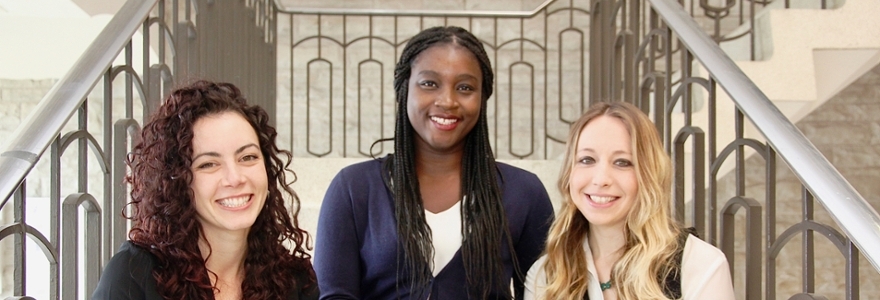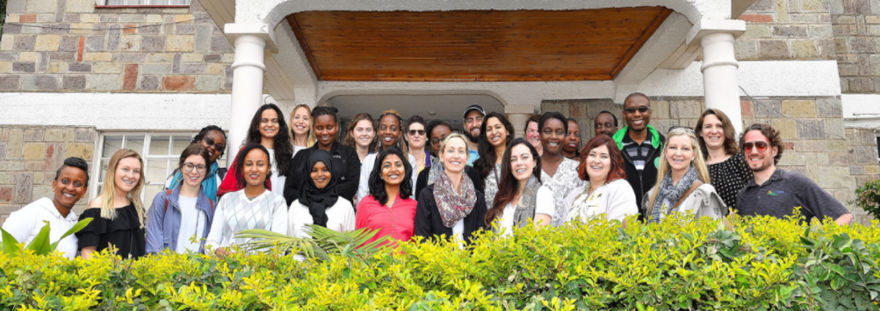
2017 Western’s World’s Challenge Challenge winners. From left, Robyn Masters, Michelle Quaye and Richelle Bird. (Photo: Paul Mayne)

2017 Western’s World’s Challenge Challenge winners. From left, Robyn Masters, Michelle Quaye and Richelle Bird. (Photo: Paul Mayne)
Think globally but act locally. It’s more than a slogan for three Western students. Robyn Masters, Richelle Bird and Michelle Quaye were recognized for their efforts in tackling mental health stigma in Kenya.
Masters and Bird, PhD students in the School and Applied Child Psychology program at the Faculty of Education, and Quaye, a medical student at Schulich School of Medicine & Dentistry, won Western’s World’s Challenge Challenge competition – an annual event where more than 30 teams think about global issues and present their solutions to a panel of academic and community judges. The team will move on to the international competition, which will be held at Western in June. They’ll compete against teams from around the world.
The team worked as part of the larger Global MINDS initiative this summer in Machakos, just outside the Kenyan capital, Nairobi, tackling mental health stigma. Bird said people with mental illness in Kenya face serious hurdles due to misinformation about mental health.
“There’s a belief that a mental health issue is due to a person being punished or the person deserves it. This leads to either no treatment or the person affected with mental illness goes to a spiritual healer for treatment,” said Bird.
Their project’s goal was to increase public understanding that mental illness should be viewed as a disability and not a punishment for personal wrongdoing. To increase public awareness, the team was paired with community partner, Community Recovery Achieved Through Entrepreneurism (CREATE) Kenya. This organization and research initiative is led by Dr. Arlene MacDougall and it was established to pair meaningful employment with psychosocial rehabilitation and community supports. This collaboration allows people with mental illness to lead full and meaningful lives.
“It’s all about connecting with the community and connecting with local partnerships. Our intention was never to tell them this is the way things should be done,” said Masters.
Empowerment is an important goal towards eliminating stigma around mental health. The project also helps those with mental illness grow as individuals so they become their own advocates for better mental health treatment.
“It’s important to empower those who have gone through the program because they’re on the front lines of changing attitudes towards mental illness. They’re also helping other people who are going through the same thing,” said Masters.
Mental health advocacy initiatives are being developed through the second aspect of the project, the advocacy incubator – a safe and supportive space for people living with mental illness where they can share their stories, ideas and work collaboratively on developing advocacy initiatives. They also receive information and materials that help them challenge misinformation and disrupt stigma associated with mental illness. The incubator is made up of people with mental illness as well as friends, family and community members.
While the advocacy incubator is an ongoing process, Bird stresses it’s a collaborative approach and it’s the community that drives it.
“We’re going to go where they want us to go,” she said.
The idea for the advocacy incubator was inspired by the advocacy initiatives already being undertaken by CREATE social business employees. Masters said one person now advocates for better mental health by speaking to members of her church and to those who are experiencing mental illness.
“It’s great for those with a mental illness to have that support in their life,” said Masters.
Economic empowerment is also part of the program. The students worked with a print shop, Point Tech Solutions, which was the initial business that CREATE Kenya developed. Not only did it create employment for those with mental illness but it developed entrepreneurship. Bird said two employees have now started their own businesses.
During the 18-month pilot project, the research discovered many psychosocial and occupational improvements, such as increased well-being, a more positive self-identity, greater productivity, stronger financial independence, improvement in occupational and social skills and greater connectedness with family and community.
The project was also a collaborative exercise with the academic community. Quaye said the project was an interdisciplinary initiative with the involvement of Western students from medicine, information studies and nursing. She added this is an international collaboration as Western students and faculty are actively working with 10 Kenyan students on the project who participated in Global MINDS.

Global MINDS students and faculty outside the Africa Mental Health Foundation in Nairobi, Kenya. (Photo courtesy of Richelle Bird)
The project’s success has been encouraging and Bird said the goal is to expand the program. Quaye hopes to create an umbrella organization that will deal with alleviating stigma around mental illness. The team is also looking at future research possibilities.
“We’ve set up outcome measures to see if our solution is working and how can it be improved,” she said.
The project has not only started to change the lives of people with mental illness in Kenya but Quaye said their experiences have also changed them.
“I think it has profoundly altered our perspective in the world as change makers.”